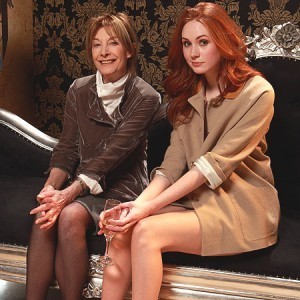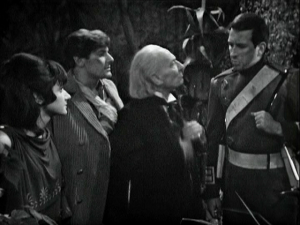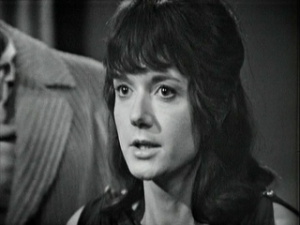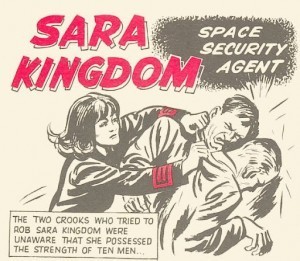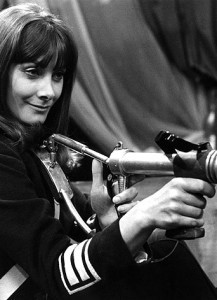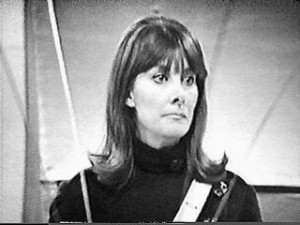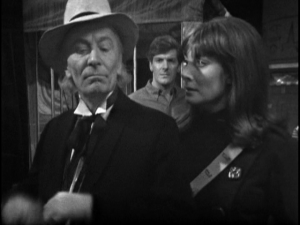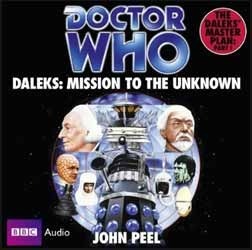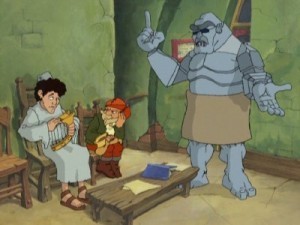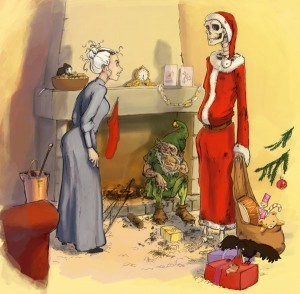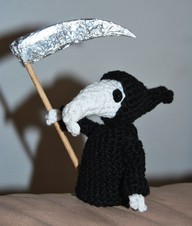Tansy Rayner Roberts's Blog, page 112
May 30, 2012
Kingdom and Katarina
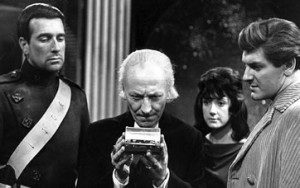
"The whole plot? In that tiny box, Doctor?" "Mmm, yes, my boy..."
The Daleks’ Masterplan is one of the most sprawling, epic, flawed, fascinating and utterly space opera-y Doctor Who stories of all time. It was the fourth ever Dalek story, screening as part of the third season of the show in 1965-6, and it marks the end of Doctor Who being a safe kids show.
I had heard so much about it in my years as a Doctor Who fan – I knew that it was the first story that killed the companion (and it did it twice), that it was twelve (and an extra) episodes long, not only a record at the time but for many decades to follow, I knew about the weird Christmas episode, and Nicholas Courtney playing a character called Bret Vyon, and all manner of plot details.
If you feel knowing all the plot twists & who dies in The Daleks Masterplan would spoil enjoyment of the story (it doesn’t, honestly, it can only help) then please look away now.
Jean Marsh now, with current Doctor Who companion Karen Gillan
It wasn’t until I actually listened to the story (available as an audio recording as most of the original TV serial was wiped) that I saw all of those facts in context, however, and began to fall in love with it as a story. Yes, even (especially) the silly Christmas episode.I was reminded of that love again recently when listening to The Anachronauts, a great Sara-and-Steven Big Finish Companion Chronicle, set in between a few acts of The Daleks’ Masterplan, and featuring the greatly talented voices of Jean Marsh and Peter Purves. (as those of you who tuned in for my Upstairs Downstairs post know, I’m on a Jean Marsh kick at the moment)
In the behind the scenes bits of the Anachronauts, they mentioned the audiobook of the novelisation of The Daleks’ Masterplan, read by both Peter and Jean, and I was interested because they are both so very good at audio work – Peter Purves does a killer Hartnell impression which really brings the story alive. Also, it occurred to me, while the audio-only version of TDM did drag on a bit at times, making me wish I could see the televised version, the good old Target novelisation, which I’d never read, might prove otherwise.
Luckily for me, both volumes of the audio book: Daleks: Mission To the Unknown and Daleks: The Mutation of Time, were available at my local library. I’ve just finished listening to the first of these, which brings me up to the middleish of the Great Doctor Who Space Opera.
I’ll start by saying that the performances are, as I had expected, brilliant. But the format of the audiobook really brought home to me how excellent the work by Big Finish is, because this BBC production was far more by-the-numbers. Peter Purves and Jean Marsh take turns reading large sections of the book, which means they end up at times reading each other’s parts – a Big Finish audio book or two-hander narrative play, like The Suffering starring Peter Purves as Steven and Maureen O’Brien as Vicki, would always edit in the actual actor playing his or her own voice. A lot more work, but far greater effect to the reader!
 I definitely felt like Sara Kingdom was given a disservice by the audiobook at times by this method – Peter Purves does not do as good a Jean Marsh impression as he does William Hartnell, and by necessity he is busily trying to make his voice sound less male in those scenes and thus ends up making Sara sound a lot more wet and passive than she actually is – our kickass Emma Peel in space.
I definitely felt like Sara Kingdom was given a disservice by the audiobook at times by this method – Peter Purves does not do as good a Jean Marsh impression as he does William Hartnell, and by necessity he is busily trying to make his voice sound less male in those scenes and thus ends up making Sara sound a lot more wet and passive than she actually is – our kickass Emma Peel in space.
Then there’s the book itself (or themselves) – both volumes were written by John Peel and it’s important to remember that authors tended to take quite a lot of liberty when writing the novelisations – that’s part of the fun of a Target, you don’t quite know what you’re going to get, whether it’s sudden scenes in the Doctor’s POV, plot developments being switched around, authors explaining motives that weren’t quite clear in the story, or on one memorable occasion, the Doctor’s entire Trojan adventure being told as if through the eyes of Homer, who was mysteriously not present in any of those scenes during the televised version.
But I can’t help noticing that Peel’s version of the story, while it rattles along with great pace and invests the villains with some marvellous motivation and character work, isn’t very kind to two rather important characters in the story: Sara Kingdom, and Katarina.
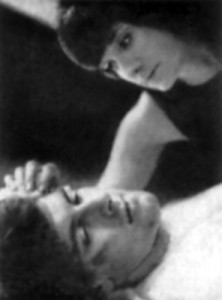 Poor Katarina. Possibly the companion least remembered by fandom as a whole – except for her death, which makes her the first Doctor Who companion to be sacrificed to lazy writing. I was quite intrigued by her on my first listen to The Daleks’ Masterplan, and found her to be a much more interesting character than that book I have by Peter Haining made out. (there’s a nice lament for the mishandling of Katarina here)
Poor Katarina. Possibly the companion least remembered by fandom as a whole – except for her death, which makes her the first Doctor Who companion to be sacrificed to lazy writing. I was quite intrigued by her on my first listen to The Daleks’ Masterplan, and found her to be a much more interesting character than that book I have by Peter Haining made out. (there’s a nice lament for the mishandling of Katarina here)
But oh, John Peel’s novelisation puts paid to any hint of that. While Katarina acts no differently in the book than it sounded like she did on screen, the other characters are constantly thinking about how stupid she is. I don’t mean once or twice. CONSTANTLY. The three men around her: the Doctor and Steven and then Bret Vyon (who joins the TARDIS crew by holding them at gunpoint, but falls instantly in love with them and joins their merry band, only occasionally remembering to point guns at them again at regular intervals) simply cannot shut up their inner commentary about the dumbness of Katarina. At one point, the author is particularly meta, having the Doctor think what a mistake it is to travel with a companion from a pre-technological era, which was the offical production reason for jettisoning the character almost as soon as she had arrived.
"If you won't be BFFs with me, Doctor, I can give you the address of my ancestor the Brig."
Vicki, played by Maureen O’Brien, had been let go at very short notice (we never hear an explanation given for that one!) and as they wrote her out in the story set during the Trojan War, they replaced her with a handmaiden who was in the right place at the wrong time, and had barely featured in the story.The story goes that the production crew realised their mistake instantly, that a companion from pre-industrial time who saw time travel and space ships as evidence of gods and magic, would never work. So they wrote her out early on in the Daleks’ Masterplan, “replacing” her with Sara Kingdom.
None of which is, as it happens, reflective of the story we see. For a start, there is no way Sara is a replacement for Katarina, except as being the token female character, because they are so deeply different, and serve the story in different ways. Also it was only a couple of years later that the Second Doctor was running around time and space with the bekilted Highlander Jamie, who also saw space stations and Cybermen as evidence of magic, and was an adored fan favourite as well as an extremely well-matched-to-his-Doctor companion.
"Trojan handmaidening is not unskilled labour!"
Katarina’s death, while problematic in many ways, is handled remarkably well in the story, and indeed the novelisation (as audiobook). After several episodes trying to wrap her head around an enormous cultural shift, mostly believing herself to already be dead and certainly believing the Doctor to be Zeus, she is beginning to ground herself in this bizarre science fictional world of flashing lights and gear sticks when she is taken captive by a Plot Extender Maniac who holds her at gunpoint and forces the TARDIS crew (not actually flying the TARDIS at this second but a different space ship) to go to a planet full of Daleks instead of the Earth, where they were heading to warn humanity about the impending invasion. The men are all stuck in a moral quandary, and indeed Bret is the only one who seriously considers sacrificing Katarina’s life for the greater good.Katarina takes control. She has been shown rudimentary controls of the ship and she knows what the big button does. For the sake of the mission and saving the galaxy from evil (concepts she grasps, coming from a time of great war, even if she can’t quite take in the scale) she sends herself and her captor out of an airlock.
It’s a shocking, brutal moment. My favourite bit is that Steven says immediately ‘she got the wrong button’ and the Doctor knows otherwise. Katarina the handmaiden was a lot of things, but she sure as hell wasn’t stupid. I was pleased that this scene and the emotional followup to her death was respectful to the character in the novelisation, and that the author managed to convey the meaning of her sacrifice rather than falling back on the unpleasant character sabotage of previous chapters.
Much though I defend Katarina, and I am deeply attached to Bret and his ridiculously cuddly relationship with the Doctor and Steven (they work as a unit for several episodes) the moment that Bret Vyon’s body hits the floor is the moment that, for me, the story really gets its groove on.
The actual plot of the story (yes there is one) is that the Daleks are about to invade the solar system, and Earth’s glorious, best-beloved, deeply trusted Bloke in Charge has sold out his own people to said Daleks, because he’s evil. That’s pretty much it. Oh, and there’s a Terranium Core (magic rock) which is super rare and hard to put together, which fuels the Dalek Doomsday Plot and the Doctor accidentally gets hold of it quite early on, leaving Mavic Chen and the Daleks to run around like headless chickens trying to get it back off him. Only instead of slapstick comedy (that comes later) this first half of the story is grim, unrelentingly grim, with shootings and political conniving and only occasional bits of banter.
This is the first time that I have really put together in my head that yes, the Terry Nation who “always” wrote the same Dalek story, really is the same Terry Nation who wrote the first season of Blake’s 7. It’s space opera, shoot-you-in-the-back style.
"Even my gun belongs in Blake's 7... Avon stole his sinister smile from ME"
I love the fact that the novelisation teases out Kingdom’s reputation as Mavic Chen’s top agent, ruthless, smart, dependable. I don’t remember how much her gender was deliberately unreferenced before her appearance in the show itself, but it’s very effective here.Of course, most people who go out of their way to listen to an audiobook of a novelisation of a 1965 Dalek story are probably the sort of people who read Programme Guides back when there were still two mm’s and an e in ‘program’ and thus already know that Kingdom is a woman. But still, it’s a nice little anachronistic touch – this is a future in which women are equal, GET THIS, 1965 TV WATCHERS, SHE’S GONNA SHOOT HER BROTHER WITHOUT BLINKING. AND THEN SHE’S GOING AFTER THE DOCTOR. SHE’S THE FUCKING TERMINATOR.
Have I mentioned how much I love Sara Kingdom?
I was greatly disappointed that the key emotional scene in which Sara Kingdom discovers that the brother she shot was telling the truth and that it’s her employer, not her brother, who betrayed the solar system to the Daleks, and makes the painful transition from ‘person who wants to kill the Doctor’ to ‘person who asks, what’s happening, Doctor’ is read by Peter Purves and not Jean Marsh. As I mentioned earlier, his Sara Kingdom is not a patch on Jean’s (for obvious reasons), and while I really enjoy his reading, it would have had greater emotional punch in her voice. Also, returning to the author rather than the voice artist… really? I get that you’re trying to make Sara Kingdom a more likeable character, but did she REALLY cry that much in the televised version? There’s a lot of crying upon crying and wobbling lips and wailing in these scenes, and it did make me cranky.
"Did I mention I have an Emmy for stoic restraint? Just sayin."
Yes, she’s devastated. We know that. So she should be. But she’s SARA “MY MIDDLE NAME IS STOIC” KINGDOM, and it’s really noticeable that it’s the narrative, not the dialogue, that utterly depowers her, and turns her into a quivering heap of feelings.To my great pleasure, though, after these uneven moments, the story kicked into another gear, and I ran out of things to complain about. Steven and Sara together make a great team, working with the prickly Hartnell Doctor. The Peel narrative does feel the need to repeat how handsome/pretty they both are, and how hot they are for each other, which doesn’t seem entirely necessary, but this passed the point of being mildly irritating all the way into funny for me.
I have greatly enjoyed the many hours listening to Daleks: Mission to the Unknown, especially the way that the novel format accentuates the dystopian space opera feel of the story, and makes all the planet-hopping feel more epic that it probably ever looked on the small scratchy black and white scene. I love how the whole thing has this amazing Blake’s 7 vibe, fifteen years before the Liberator turned up. The characterisation, even of minor characters, is very effective, and I feel I’m getting a much better grip on the story than I did before (though of course it’s not entirely the same story in some places). Peel’s real brilliance is in the way he puts scenes in the point of view of the Daleks, making them feel like individuals, which serves to make them more effective villains (especially in the transition to the page). He is a very good at effective adaptation.
"Stick with me, kid. We'll ditch Dodo and pick you up just in time for The Gunfighters."
Peter Purves and Jean Marsh do a fabulous job – and while an audio book in which she gets to say all of Sara’s lines and he gets to say all of Steven’s and the Doctor’s lines would have been a zillion times better, there is something to be said for the single voice doing big chunks technique, and at least we do have proper Dalek voices edited in, they’re not total barbarians. I’m looking forward to the second half of the story, not least because I’ve been reading recently about how the second half was almost completely written by NOT Terry Nation at all but Dennis Spooner, and I want to spot the seams where Blake’s 7 sneakily transforms into Red Dwarf. I’m even looking forward to the Christmas episode because COME ON, pyramids and policemen and random vaudeville! I’m totally voting that we save that one first when we really get time machines and are allowed to go back and find all the missing episodes.I do think, however, that it was important to note the way that the novelisation imposed a few problematic gender issues on to the story that simply weren’t there in the original. I remember coming away from listening to the sound recording of the 1965 The Daleks’ Masterplan delighted at how feminist it felt, particularly the futuristic equality vibe between Steven and Sara, but also that Katarina’s death was less of a throwaway moment than I had always been led to believe. Sara Kingdom is the first female companion since the original Barbara to be a grown woman rather than a teenage girl, and she got to act as if that was the case most of the time. I will enjoy the second novelisation far more if it refrains from making her sob uncontrollably, moon romantically over Steven, or sprain an ankle.
Most importantly, when Sara dies at the end, trying to save and protect the Doctor, I want very much it to be portrayed as the epic end to her own story, not simply a plot detail used to make Steven and the Doctor sad. So no pressure at all there, Mr Peel.
*takes deep breath*
*goes in*
Doctor Who: Daleks: Mission to the Unknown
An audiobook of a TARGET novelisation (by John Peel)
of half of a lost Doctor Who story (The Daleks’ Masterplan) from 1965-66.
Read by Jean Marsh, Peter Purves, with Dalek warblings by Nicholas Briggs
BBC Audio
May 28, 2012
On Writing Steampunk Fantasy with Fairies and Frocks In
 So, I’m writing steampunk. Years after it was a Thing, and probably way past its popularity bubble. It’s exactly the sort of thing that writers get warned about – you don’t respond to the Current New Thing, you write what you want and BECOME the Next New Thing.
So, I’m writing steampunk. Years after it was a Thing, and probably way past its popularity bubble. It’s exactly the sort of thing that writers get warned about – you don’t respond to the Current New Thing, you write what you want and BECOME the Next New Thing.
Eh. That sounds so tiring. And besides, steampunk may well be the Next New Thing too. Look at how they’ve been predicting the fall of vampires for the last fifteen years… oddly as it turns out, they’re immortal. Who knew?
The steampunk thing has been creeping up on me for a while now. It’s just so pretty. The art and the costume and sure, there are books, whatever, OMG THE BOOK COVERS. I’ve bought steampunk jewellery, I’ve cooed over steampunk cakes, and I totally want to take the steampunk K9 home with me. It’s such an aesthetically pleasurable phenomenon. Anything that brings back top hats is all right by me.
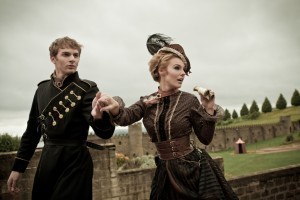 The other thing that has been nibbling away at me lately, since I finished my big trilogy, sighed with relief, and started looking around for my own personal Next Thing, is my love of costume drama. Looking back on the Creature Court trilogy, one of the things I found myself talking about most in my recent blog tour was my use of historical detail in building my fantasy world, and the influences of historical fiction and social history that bled into it. The same can be said for Love and Romanpunk, which borrowed from not only my deeply ingrained Roman studies but also my interest in obscure characters from the Byron-Shelley family melodrama.
The other thing that has been nibbling away at me lately, since I finished my big trilogy, sighed with relief, and started looking around for my own personal Next Thing, is my love of costume drama. Looking back on the Creature Court trilogy, one of the things I found myself talking about most in my recent blog tour was my use of historical detail in building my fantasy world, and the influences of historical fiction and social history that bled into it. The same can be said for Love and Romanpunk, which borrowed from not only my deeply ingrained Roman studies but also my interest in obscure characters from the Byron-Shelley family melodrama.
The book I wrote straight after The Creature Court was urban fantasy, as contemporary as they come, all smart phones and Google. Once I was done with Nancy Napoleon, I started craving history again.
And… and… and… there’s Downton Abbey. Which I love beyond all measure for its cracky plots and ramped up slapstick drama, and the adorable outfits and the meaningful looks. Ever since I fell for its charms, my head has been screaming ‘DOWNTON ABBEY WITH MAGIC, WRITE IT, WRITE IT.’
 That’s not what I’m writing right now. But that’s where I started thinking again about history and fantasy and frocks and Edwardiana, all things that I adore. Upstairs Downstairs ingrained upon me at an early age and I recently listened to a gorgeous audiobook of the original novelisation of the first season, read by the marvellous Jean Marsh. Then, quite by accident, I ended up with a DVD of season 2 of the original series, and started watching it…
That’s not what I’m writing right now. But that’s where I started thinking again about history and fantasy and frocks and Edwardiana, all things that I adore. Upstairs Downstairs ingrained upon me at an early age and I recently listened to a gorgeous audiobook of the original novelisation of the first season, read by the marvellous Jean Marsh. Then, quite by accident, I ended up with a DVD of season 2 of the original series, and started watching it…
Oh, those little 1970′s Edwardian people. How I adore them! Their stiff, angry scandals and their outrage at cutting the cucumber wrong, and oh the class warfare, how pointed and cutting. I just watched an episode in which the flighty aristocratic daughter Elizabeth, who has already managed a failed marriage and not-quite-the-right-side-of-the-blanket baby, throws herself into the joys of suffragettism and gets away with it scot free because of her family name – meanwhile her poor long-suffering maid Rose who was only trying to stop her going too far is sent to Holloway with the rest of the women.
It’s horrific and mildly hilarious in its melodrama, but the show doesn’t shy away from the cruelty of the treatment of the women, and the brutal way in which they were force-fed to break their hunger strikes. More importantly, though Elizabeth throws herself on the mercy of a vaguely sympathetic and politically connected man to save her friends, and is horrified to discover what Rose is going through because of her, she is still never affected by it as deeply as Rose, who of course is quite humiliated and emotionally scarred by the experience, but obliged not to show it too deeply in public.
I remember Upstairs Downstairs as being quite fluffy, romantic and drama-llama, but for a show made in the early 1970′s on what is clearly a limited budget even for the time, it’s fascinating to me how much they do engage with issues to do with class and gender inequalities in the early 20th century, and the balance they keep between ensuring you sympathise with the protagonists, and not letting them off too lightly. It makes Downton Abbey look like a teddy bear’s picnic!
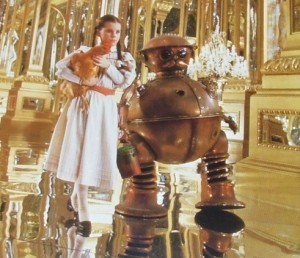 Where was I? Oh, STEAMPUNK. Well, my current story is part of my desire to write more in the way of historical-ish stories with magic in them, and to mess with Victoriana and Edwardiana and the governess gothic, and mash it up with other eras of history, and a whole bunch of Orlando Furioso started worming its way in, and the fairies made total sense, but then the clockwork robots and the Extraordinary Device Brothers turned up and frankly, I have no idea what I’m doing right now.
Where was I? Oh, STEAMPUNK. Well, my current story is part of my desire to write more in the way of historical-ish stories with magic in them, and to mess with Victoriana and Edwardiana and the governess gothic, and mash it up with other eras of history, and a whole bunch of Orlando Furioso started worming its way in, and the fairies made total sense, but then the clockwork robots and the Extraordinary Device Brothers turned up and frankly, I have no idea what I’m doing right now.
BUT I LIKE IT.
The future is coming up cog wheels and brass polish, and I don’t care if it’s fashionable or not by the time I’m done with the story. I’m too busy hugging it.
May 27, 2012
Pratchett’s Women VIII: Has Scythe, Will Teach School
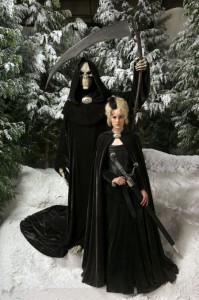 Many spoilers abound for the plots & endings of Soul Music, Hogfather, Thief of Time by Terry Pratchett
Many spoilers abound for the plots & endings of Soul Music, Hogfather, Thief of Time by Terry Pratchett
Rereading all three of the Susan Sto Helit (or Susan Death) books was something I had been greatly looking forward to. I’ve always enjoyed Susan as a character even when I didn’t especially love the books she featured in – Soul Music, for instance, was never a favourite of mine, though the animated version of it is dear to my heart (funnily enough it DOES work better with a soundtrack of relevant examples of the music that the story is about), Hogfather is one I’ve often found bewildering with moments of occasional joy, and I never remember anything about Thief of Time at all.
This time around, I enjoyed all three rather better than I had in the past, but in reading them specifically for this blogging series, I couldn’t help noticing that, well. Considering what a popular and beloved character Susan is, it’s interesting what a small space she takes up in each of the books.
Discworld novels are always ensemble productions; this is part of their charm. But it was frustrating to me, reading these books mainly for Susan, how little we see of her. While she grows up and develops into an awesome adult from book to book, the plot is never actually about her – she’s not a protagonist, but fills the role of mentor/helper every time.
Generally speaking she gets a very interesting introduction in each of the books, spends most of the middle part wandering around being cross at people, exchanging banter with the minor supporting cast and not getting in the way of the plot, and then is finally allowed to get involved at the very end of the story in some kind of epic showdown which is keyed to her particular talents, allows for character development, and shows how awesome she is.
I don’t want to fall into the trap of reviewing books negatively for not meeting my own (possibly unrealistic) expectations, but considering how iconic Susan has become (she is for instance the young female character most often cited by casual readers to me as an example of strong women in the Discworld) is it too much to ask that she gets one book as the central character?
We first meet Susan in Soul Music, a schoolgirl with mysterious abilities and a sharp tongue. She’s immediately fantastic on the page – sarcastic and intelligent but very guarded, all her secret hurts piled up inside where no one, even the reader, can get access to them.
Soul Music is very much a sequel and a response to Mort, which is one of the most narratively satisfying and well plotted of the early Discworld novels, generally regarded as the one where the series ‘got good.’ This novel was about Death’s apprentice, who failed in his task to be a decent back up Death, but succeeded awkwardly in the actual reason he was taken on in the first place, to hook up with Death’s adopted daughter Ysabell. A key plot point revolves around Mort’s inability to accept the needs of the Duty, and how he saves the life of a beautiful princess after it should have ended, thereby throwing reality into a tailspin. At the end of his book, he dies and Death turns the hourglass over to give him more time, but mathematics are a bitch, and that means he’s probably only going to get as much time again as he has already had…
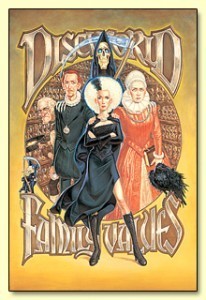 Susan’s story in Soul Music plays off that of Mort, her father. Shortly after both her parents are killed in a carriage accident, she finds herself having to pick up the pieces as her Grandfather (Death) abandons his Duty in order to ‘forget.’ I rather love the sneakiness of this plot line, as it becomes very obvious that Death is grieving the loss of Ysabell and Mort, and dealing with his guilt over not using his powers to ‘save’ them, but it’s never fully acknowledged until the end. Susan acquires the scythe, the rat and her Grandfather’s job… and starts to remember all those odd family visits when she was very young.
Susan’s story in Soul Music plays off that of Mort, her father. Shortly after both her parents are killed in a carriage accident, she finds herself having to pick up the pieces as her Grandfather (Death) abandons his Duty in order to ‘forget.’ I rather love the sneakiness of this plot line, as it becomes very obvious that Death is grieving the loss of Ysabell and Mort, and dealing with his guilt over not using his powers to ‘save’ them, but it’s never fully acknowledged until the end. Susan acquires the scythe, the rat and her Grandfather’s job… and starts to remember all those odd family visits when she was very young.
All this, however, is a two-stranded sub plot to the main event of the story, in which a young musician, Buddy, is possessed by an ancient evil inside a guitar and with a little help from his band brings Music With Rocks In to the Discworld, one of a series of magical pop culture invasions. It appears as if Susan, rather taken with Buddy, is going to save him from assassins just as her father did for Princess Keli – but the twist is that she doesn’t, at all. The music saves him instead, and warps reality. Rather than being the cause of the disaster, Susan is the one who picks up the pieces.
While Mort had the A plot in the novel named after him, Susan stays mostly in the B or even C plot of her debut novel, only occasionally crossing paths with the Band (regularly mistaken as a groupie) until the final act.
Soul Music passes the Bechdel Test, as there is a scene early on where we see Susan talking with her headmistress, another with her school friends, and a very cute one with a Valkyrie who reminds her of a gym mistress, but it is notable that the majority of the novel involves her interacting with men or male characters: Albert, the rat and the raven; the Band; Ridcully and the wizards, and her grandfather Death.
 The climax of the story is very much about Susan and Death coming to an accord, and sharing/understanding their mutual loss – as well as resolving the elephant in the room, which is that Death let his own family die, when he could have saved them. Buddy and the Band literally fade out as the story is revealed to have really been about Susan and Death and their issues all along. However, I’m not convinced by the end that the two plots really had enough to do with each other, despite some clever uses of thematic resonance to pretend they are part of the same story.
The climax of the story is very much about Susan and Death coming to an accord, and sharing/understanding their mutual loss – as well as resolving the elephant in the room, which is that Death let his own family die, when he could have saved them. Buddy and the Band literally fade out as the story is revealed to have really been about Susan and Death and their issues all along. However, I’m not convinced by the end that the two plots really had enough to do with each other, despite some clever uses of thematic resonance to pretend they are part of the same story.
Susan and Buddy are worth mentioning because of their blink-and-you’ll-miss-it ninja romance, which is a pattern across the Susan stories – when attracted to young men, she will typically show no sign of it, and eventually they go away. In this case, the story ends on a note that suggests that they might have a future in which they at least know each other (surely the lowest bar for a successful relationship, even in the Discworld) but we never hear about him again.
Susan & the Hogfather by Pika_la_Cynique
HOGFATHERIn Hogfather, we see yet another magical threat to the Discworld, mostly involving male characters. Death takes himself out of the equation, leaving Susan to pick up the scythe and take over. It’s basically Soul Music with Hogswatchnight (the Discworld Christmas) and the Tooth Fairies, instead of Music With Rocks In. The wizards even leap about in a slapstick sub plot.
I’ve never been fond of this one at all – it belongs to an era of Discworld novels that I have not tended to appreciate, and it’s one of those Pratchett novels like Carpe Jugulum that actually makes no sense until you’ve got to the end and re-read it. I know it’s loved by many, but I find that everything cool about it (like the conflagration of mythologies and folklore) is done far better in other Discworld novels.
Having said that, it also has some excellent bits, and Susan is magnificent even if once again she is relegated to the role of helper/mentor/tidyupperofdisasters and isn’t allowed to play with the plot-relevant main characters for more than short bursts.
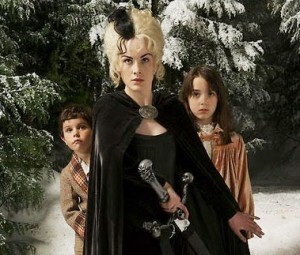 What most bugs me about Hogfather is that there is no protagonist – or if there is, then it is the crazed assassin Teatime, who is not only the bad guy but a very unpleasant character to follow around. For this reason I think I prefer the TV movie to the book, because of not being in anyone’s head, plus the bonus of Michelle Dockery’s fabulous eyebrows. I always mean to make Hogfather the book a Christmas reading tradition as I know many Pratchett fans do, but never get around to it. The movie, however, I saw for the first time last Christmas and I can definitely see myself making it part of an annual ritual.
What most bugs me about Hogfather is that there is no protagonist – or if there is, then it is the crazed assassin Teatime, who is not only the bad guy but a very unpleasant character to follow around. For this reason I think I prefer the TV movie to the book, because of not being in anyone’s head, plus the bonus of Michelle Dockery’s fabulous eyebrows. I always mean to make Hogfather the book a Christmas reading tradition as I know many Pratchett fans do, but never get around to it. The movie, however, I saw for the first time last Christmas and I can definitely see myself making it part of an annual ritual.
Ahem. But let’s get back to talking about the book. The Susan we meet here has moved past her schooldays to become a governess, and the scenes in which we see her actively governessing are the best in the book. It makes you wonder how governesses who don’t have eldritch powers possibly cope with the requirements of the job, particularly when it comes to dealing with monsters under the bed.
Susan’s steely practicality is shown to great effect in the scene where she and little Twyla give one particular monster a good seeing to with the poker, while the jolly and ignorant parents and their upper crust friends think the whole thing is an amusing bit of child psychology. Worth noting that young Twyla and the Tooth Fairy Violet are the only female characters Susan interacts with, and neither have much time in the book at all.
Indeed, there’s a fair bit of psychology (or in Discworld terms, Headology) going on in this book as a whole. Susan’s childhood and her lack of romanticism turn out to be of great benefits for this particular adventure, which revolves around the childhood belief in the Hogfather, and folklore traditions in particular. The skills she has picked up from wiping little noses and pinning up brightly coloured paintings (not to mention telling improbable stories to wide-eyed four-year-olds) turn out to be vital survival skills, a twist I really enjoy now as a mother myself to small children.
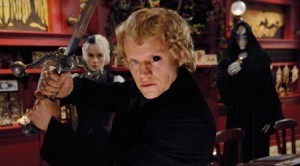 But again, Susan appears in so many fewer scenes than I expected, and while she is the one who faces Teatime with her skills of ruthless governessing, more than once, it still doesn’t feel like she is being treated like a hero by the narrative. Her interactions with Bilious, the Oh God of Hangovers, follow the pattern of Susan’s super-subtle ninja romances (though to be fair this one is so subtle I’m not even sure it’s supposed to be read that way) and he falls happily in love with someone else in the course of the story. Susan’s reaction to that romance is a quiet and understated deflation as if she hadn’t even decided if she liked him yet, and is determined to be nothing more than mildly wistful about his sudden attachment to the rather soppy Tooth Fairy Violet.
But again, Susan appears in so many fewer scenes than I expected, and while she is the one who faces Teatime with her skills of ruthless governessing, more than once, it still doesn’t feel like she is being treated like a hero by the narrative. Her interactions with Bilious, the Oh God of Hangovers, follow the pattern of Susan’s super-subtle ninja romances (though to be fair this one is so subtle I’m not even sure it’s supposed to be read that way) and he falls happily in love with someone else in the course of the story. Susan’s reaction to that romance is a quiet and understated deflation as if she hadn’t even decided if she liked him yet, and is determined to be nothing more than mildly wistful about his sudden attachment to the rather soppy Tooth Fairy Violet.
More and more, it seems that Susan is outside the human race, looking in.
While the book as a whole is quite uneven, I do love the ending of Hogfather, where Susan has already beaten Teatime in the tradition scythe-wielding way in the Tooth Fairy’s castle, and then has to save the day again by rescuing the mythic version of the Hogfather in form of a frightened wild boar, and then after all that, the threat turns domestic.
In the home of her employers, a battered and vicious Teatime appears, and tries to make Susan choose between the safety of her children and Death himself. Susan ends up throwing the nursery poker (which only kills monsters) through Death and into Teatime, killing him.
Once again, the finale behaves as if Susan was always the protagonist of the story after all, rather than someone helping out. If only the middle of the book felt the same way!
With Thief of Time, we have another story ostensibly about other people, whom Susan is going to help out. There’s rather less focus on Death as a central character, as he doesn’t get much of a subplot to himself this time around, which allows for a bit more Susan attention. The Auditors, otherworldly creatures of Order who were behind Teatime’s assassination of the Hogfather, are now attempting to stop time itself through the creation of a truly perfect glass clock out of a fairy tale.
The titular Thief of Time is a young orphan, Lobsang Ludd, who was raised by the Monks of History and turns out to be the illegitimate son of Time herself. He is taken on as an apprentice by Lu-Tze the Sweeper, who is preparing him for a great quest, to stop the building of the clock and save history.
The master-apprentice relationship between the two men is smart and banterific, with all manner of hidden depths to it. Lu-Tze is probably an amalgam of a whole bunch of racial stereotypes, but he’s so enjoyable on the page, with his subversion of traditional martial arts heroics. He feels at times like a male amalgam of Granny Weatherwax and Nanny Ogg – capable of great power, but most happy when people see nothing but a little old unthreatening person and underestimate him like whoa.
Likewise, Lobsang’s frustration with the master who won’t apparently teach him anything (while sneakily teaching him all of the important things) mirrors Magrat and Agnes’ respective journeys alongside the older witches of Lancre. As suggested by the title, the book is very much Lobsang’s story, and the climax of the story revolves around how he is able to utilise Lu-Tze’s teachings.
“Most people call me Lu-Tze, lad. Or ‘Sweeper’. Until they get to know me better, some call me ‘Get out of the way’. I’ve never been very venerable, except in cases of bad spelling.”
Susan Sto Helit by selanpike
So where’s Susan? Tidying up in the B-plot, as usual. She is now a school teacher, and one who uses all of her otherworldly abilities and innate practical ruthlessness to provide an unparalleled education for the children under her care. She has a life, in other words, and isn’t overly pleased to be summoned indirectly by her grandfather (he never asks in person, always sends the rat and the raven!) to interfere in a matter he himself is not allowed to be involved with.Once again, she disappears for large sections of the book, while Lobsang is Learning Things and the Auditors are discovering how hard it is to walk in human shape without things getting all messy. Susan isn’t given much at all to do until the final act, when time is stopped and everything goes pear-shaped.
Along with Lu-Tse and Lobsang, the other most interesting relationship in Thief of Time is between Susan and Myria/Unity LeJean, the Auditor who takes on human shape to commission the clock and is quickly seduced, damaged and infiltrated by the messiness of human nature. It’s the closest thing we see to a female friendship for Susan since the schoolgirls from Soul Music (who didn’t really know her that well), and it’s an intense, complicated, utterly awkward combination of two people who have to work hard at pretending to be entirely human.
The use of chocolate and other foods as sensory weapons against the Auditors (who were intensely vulnerable to anything that smacked of humanity) and Unity’s use of illogical signs to keep them at bay were nothing short of brilliant, and the “boy talk” scene in which Unity embarrasses Susan with intimate questions and revelations about their respective attractions for Lobsang and his “brother” (really the other half of him) Jeremy was greatly revealing of both of their characters.
While there were a couple of elements of the way Myria/Unity’s character was handled that made me uncomfortable (mostly her self-diagnosis of being Completely Insane and how that meant she had to die, but also the whole gendered joke about women’s relationship to chocolate which had been set up around Susan from the start) all her scenes were quite electric, and I enjoyed how she and Susan worked as a team.
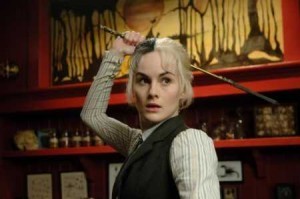 Susan names Unity, insisting its a better choice for her than Myria – being an individual rather than representing the many – and it’s a deeply symbolic act that ties them together. I’m so sorry that the story ended with Unity’s suicide, as I would have adored to see her embracing her new humanity (with Susan’s help) rather than giving up on it.
Susan names Unity, insisting its a better choice for her than Myria – being an individual rather than representing the many – and it’s a deeply symbolic act that ties them together. I’m so sorry that the story ended with Unity’s suicide, as I would have adored to see her embracing her new humanity (with Susan’s help) rather than giving up on it.
Meanwhile, there’s a romance. Yes, really. Between Susan and Lobsang. Possibly. They hardly ever cross paths through the book, but this is the (romantic) story of Susan’s life. This particular ninja romance with Lobsang is handled exactly the same way as her interactions with Buddy and Bilious: their few scenes together involve them getting a bit cross at each other on early acquaintance and never quite managing to convey any attraction at all. Susan’s buried interest in Lobsang is noticed by other characters, but not something she ever admits to – and while the two of them have one or two angst-filled conversations once it becomes obvious that he is going to have to leave humanity behind, there is no overt romance until the very final scene of the book, which makes it clear through some very understated (DID I MENTION SUBTLE) writing that Lobsang (maybe) returns Susan’s (possible) feelings.
In other words, they’re both utterly repressed and not quite human – perfect for each other, a bit doomed, and if there’s ever another Susan book I quite expect that Lobsang will not be mentioned again.
I wasn’t expecting to be quite so critical of Susan’s portrayal in the Discworld books – she’s always been a character I liked (and still do like, very much) and I think she’s a great example of the way that Pratchett improved radically in his portrayal of young female characters after his first ten or so books. It’s just a shame that with such a fabulous character, he seemed to not quite know what to do with her, or how to allow her to be a protagonist through an entire book, instead of being introduced and then waiting patiently while everyone else gets the character development and plot circles out of the way, and turning up with her scythe at the end to kick butt and take names.
Perhaps her story is done. She has certainly grown up from book to book, and what we have of her is awesome. A powerful female character who uses domestic skills as well as necessary battle skills, who isn’t distracted by romances, who gets the job done and then returns to the life she has built for herself. She’s extraordinary.
But if she does get to pick up the scythe one more time, before Pratchett finally lays down that pen of his, I hope he allows her to take central stage for a whole book, in a plot that revolves around her: Susan Sto Helit, Granddaughter of Death. Protagonist.
=====
 Previous posts in this series:
Previous posts in this series:
Pratchett’s Women: The Boobs, The Bad and the Broomsticks
Pratchett’s Women II – Slash! Stab! A Lesson in Practical Queening in Lords and Ladies
Pratchett’s Women III – Werewolf Glamour and the Sexing of Dwarves in Guards, Guards!, Men at Arms, Feet of Clay
Pratchett’s Women IV: His Henpecked Voice in Jingo & The Fifth Elephant
Pratchett’s Women V: The Seamstress Redemption in Night Watch
Pratchett’s Women VI: Pole Dancers, Goblin Girls, and the Family Man in Thud and Snuff
Pratchett’s Women VII: A Wonderful Personality and Good Hair
May 24, 2012
Friday Links is Still Writing Strong Female Characters
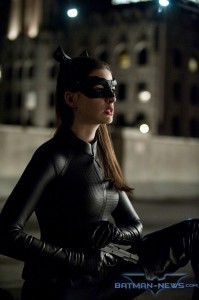 Greg Rucka, like Joss Whedon before him, reveals how he writes female characters that don’t suck, in a medium that has a tendency to treat female characters badly.
Greg Rucka, like Joss Whedon before him, reveals how he writes female characters that don’t suck, in a medium that has a tendency to treat female characters badly.
This one is separate to an earlier interview with Rucka, reported on by DC Women Kicking Ass, in which he complained about the poor treatment of female superheroes by Hollywood and the comic book world.
Tor.com talks about the evolution of female superheroes in movies, and how they’re finally getting it a bit right with Black Widow and Catwoman.
Cassandra Clare talks about rape myths and why there isn’t one ‘right’ way for a fictional character to deal with sexual assault, just like in real life.
Ben Peek on the appalling “celebrity rehabilitation” of notorious political racist Pauline Hanson through Australian commercial television, and how she’s still being allowed wide media coverage of her white supremacist views.
Helen Merrick on using spec fic in the classroom.
A review of Beyond Binary that actually mentions my story! Hooray!
Galactic Suburbia 60: In Which, Cake
The new episode is up! Grab it from our site, or download it from iTunes!
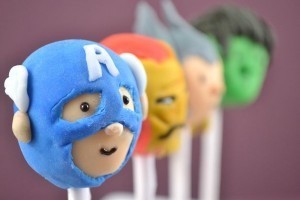 In which we celebrate our 60th episode and Peter McNamara Award for Excellence win with cake, yarn and superheroes. For best results, consume this podcast with fabulous cake and/or sock yarn.
In which we celebrate our 60th episode and Peter McNamara Award for Excellence win with cake, yarn and superheroes. For best results, consume this podcast with fabulous cake and/or sock yarn.
News
Aurealis Awards:
Sturgeon shortlist
50% female speakers at a tech conference and how it was done
The Hugo Packet is released
Kirstyn examines her 23 year old self through the lens of her current feminist self.
Marvel Comics follows Archie’s lead with a gay marriage between Northstar and Kyle: the news was launched by Whoopi Goldberg on The View.
Chicks Unravel Time announced from Mad Norwegian Press and Tansy is in it
What Culture Have we Consumed?
Alex: The Monster, Garth Nix and Sean Williams (Troubletwisters #2); Agatha H and the Clockwork Princess, Phil and Kaia Foglio; Birds of Prey: Dead of Winter; Wonder Woman: Rise of the Olympian
Tansy: Discount Armageddon by Seanan McGuire, Made in Dagenham
Alisa: Black Heart by Holly Black; The Avengers movie
Please send feedback to us (especially about any cake you may have eaten or yarn you may have knitted with this podcast) at galacticsuburbia@gmail.com, follow us on Twitter at @galacticsuburbs, check out Galactic Suburbia Podcast on Facebook and don’t forget to leave a review on iTunes if you love us!
May 23, 2012
Announcing Chicks Unravel Time
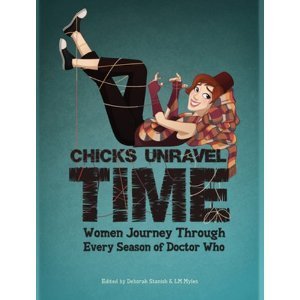 There are very few instances in which I would wholeheartedly enjoy being called a chick, but this one is top of the list…
There are very few instances in which I would wholeheartedly enjoy being called a chick, but this one is top of the list…
From Amazon:
The sister book to the 2011 Hugo Award-winning Chicks Dig Time Lords…
In Chicks Unravel Time, editors Deborah Stanish (Whedonistas) and L.M. Myles bring together a host of award-winning female writers, media professionals and scientists to examine each season of new and classic Doctor Who from their unique perspectives.
Diana Gabaldon discusses how Jamie McCrimmon inspired her best-selling Outlander series, and Barbara Hambly (Benjamin January Mysteries) examines the delicate balance of rebooting a TV show. Seanan McGuire (Toby Daye series) reveals the power and pain of waiting in Series 5, and Una McCormack (The King’s Dragon) argues that Sylvester McCoy’s final year of Doctor Who is the show’s best season ever.
Other contributors include Juliet E. McKenna (Einarrin series), Tansy Rayner Roberts (Power and Majesty), Sarah Lotz (The Mall), Martha Wells (The Cloud Roads), Joan Frances Turner (Dust), Rachel Swirsky (“Fields of Gold”) and Aliette de Bodard (Obsidian and Blood series).
I was so excited to be invited to be part of this book, now available for pre-order on Amazon. The season I got to tackle was Season 23 AKA Trial of a Time Lord and yes, it was one of the ones I volunteered for! I had a marvellous time rewatching and wrapping my head around one of the more problematic and controversial seasons, which was also (in parts) one of the more beloved and watched-a-zillion-times stories of my childhood. And I can’t wait to see what the other contributors came up with – I can’t believe they got Diana Gabaldon to talk about Jamie! *bounces happily*
Chicks Unravel Time: Women Journey Through Every Season of Doctor Who will be released in November.
May 22, 2012
Swords Down, Flappers!
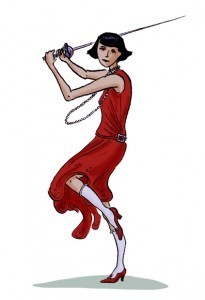 Happy birthday to me! My Flappers With Swords blog tour is now done. It was a boutique tour in the end, largely because I found myself writing substantial essays instead of short, easy posts, and I exhausted myself all too quickly. Still, I had great fun talking about history, women, and some of the crunchier (and occasionally, sillier issues I came across while writing the Creature Court series, and fantasy fiction in general.
Happy birthday to me! My Flappers With Swords blog tour is now done. It was a boutique tour in the end, largely because I found myself writing substantial essays instead of short, easy posts, and I exhausted myself all too quickly. Still, I had great fun talking about history, women, and some of the crunchier (and occasionally, sillier issues I came across while writing the Creature Court series, and fantasy fiction in general.
If any new readers discovered me and my Kindlicious editions of the Creature Court books in recent weeks, do let me know! These things make authors very happy.
If you didn’t get a chance to check out all the posts, here they are below. Much gratitude to everyone who has written a review for the Creature Court books on Goodreads or Amazon, and an extra special multitude of thanks to the many awesome bloggers who let me borrow their space & their readership to help get word of my books out there. You all rock!
THE POSTS
“What Epic Fantasy Could Learn From Batman” at Confessions of a Curator
“Classics Nerdery” at Karen Healey’s blog
“Where Costumes Collide”, at Fangtastic Fiction
“Looking for the Women in Ancient Rome” at Kate Elliott’s I Make Up Worlds
“Food for Thought (in Fantasy Fiction)” at the Voyager blog
“Oops I got History in my Fantasy (again)” at Bibliophile Stalker
“Stealing Stuff from History (the Roman edition)” at Stephanie Dray’s blog
and Charles Tan interviewed me for SF Signal
Special extra MEGA thanks to the awesome Kathleen Jennings who produced the flapper with sword who has been getting such a workout over the last few weeks. If you’re not following her gorgeous blog (indeed all the blogs who hosted me in recent weeks) you are missing out.
May 21, 2012
The Outcast Chronicles
No one has been waiting for these books as long as I have! Well, except maybe Rowena herself… I can’t wait to see what she’s done with them.
May 20, 2012
Weekend go Whoosh
The weekend was a blur, roadrunner style. Thank goodness I was caught up with my wordcount so I wasn’t actually trying to write at the same time as juggling the two daughters and their need for snuggles, soccer parenting, the birthday card factory line, actual birthday party attendance involving two year old’s first dip in a pool (only mildly traumatic), the desperate need to catch up on Futurama movies as a family unit, the weekly grocery shop, picking up daughter after Polish dancing and, oh yes, a migraine.
Whereas what I actually wanted to do all weekend was to lie on the library bed and read my new Bernice Summerfield: The Inside Story book constantly. And/or listen to the novelisation of the Dalek Masterplan which I got out from the library in a flurry of Jean Marsh & Peter Purves adoration (their recent audio play The Anachronauts totally did for me, and Jean Marsh’s brilliant audio rendition of the original Upstairs Downstairs novel complete with grumpy Scottish butler impersonation DID NOT HELP).
May is disappearing at a frantic rate. People keep asking what I want for my birthday. More time please, instead of it ribboning out of my fingers and disappearing into the sunset.
June is upon us, and with it comes not only the school holidays (which I rather look forward to these days – my elder daughter is old enough that having her home is marginally more compatible with me getting some writing done than is having to juggle her school & activity routine) but also Continuum travel, and one of my twice-yearly bouts of actual outside-the-house work.
So… the novel writing is likely to slow in the first half of June, which is frustrating as I’m currently on something of a roll. Luckily I have signed up for the Clarion Write-a-thon (proper link to my page here – I think it wasn’t set up yet last time I linked) to get me back on track.
This year’s goal is simply to produce more stuff. Stories, books whatever. Words, Tansy, words!
May 18, 2012
Watching New Who: Blink
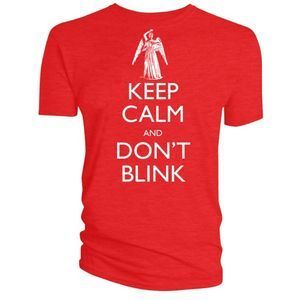 We would like to thank everyone who nominated our “New Who in Conversation” series for the William Atheling Jr Award – it’s a great honour to be on the ballot! Voting for the annual Ditmar Awards (which the Atheling is included in) is open to all members of Swancon 36 (2011 Natcon – Perth) and Craftinomicon (2012 Natcon – Melbourne), and can be done online.
We would like to thank everyone who nominated our “New Who in Conversation” series for the William Atheling Jr Award – it’s a great honour to be on the ballot! Voting for the annual Ditmar Awards (which the Atheling is included in) is open to all members of Swancon 36 (2011 Natcon – Perth) and Craftinomicon (2012 Natcon – Melbourne), and can be done online.
We’re joined today by guest viewer Joanne Anderton, who is discovering New Who for the first time!
“Blink”
Season three, episode ten
Sally Sparrow – Carey Mulligan
The Doctor – David Tennant
Martha Jones – Freema Agyeman
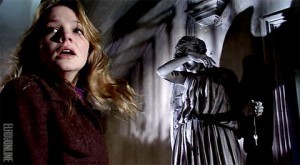 TEHANI:
TEHANI:
We move straight from the excellence that is “Human Nature / The Family of Blood” into the completely different, but equally amazing, “Blink”. And I want to say it straight up – Sally Sparrow ROCKS. Carey Mulligan, who plays Sparrow, absolutely owns this episode – it’s pretty amazing, for a one off appearance.
She shares very little screen time with the Doctor, as this is a “Doctor-lite” episode, and I wonder if this lets us really embrace her – she IS the focus of the episode. While the Doctor is there, making things happen, he’s not THERE, onscreen, with his dazzling charisma – it’s all about Sally – ordinary Sally thrown into the strangest of events – who really gets the job done. I LOVE her!
Favourite line: “I’m clever, and I’m listening. And don’t patronise me, because people have died and I’m not happy.” Go Sally – Doctor smackdown!
And two episodes in a row we have a gorgeous, strong woman finding the Doctor, and passing him up. Poor Matron Redfern in the preceding episodes really had a hard job of it, but Sally did it splendidly – she recognised the Doctor for who and what he is, and it made her choice easy.
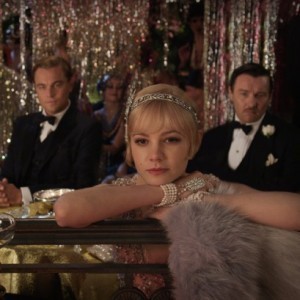 TANSY:
TANSY:
I think Sally Sparrow is the character most requested to return as a companion – and as Carey Mulligan’s star rises in Hollywood it becomes less and less likely. She is playing Daisy in the new Great Gatsby movie opposite Leo DiCaprio!!
TEHANI:
Even more than Sophia Myles?? Wow, impressive!
DAVID:
Yes, Sally really is the star of this episode. She has some wonderful lines, and we see the whole range of human emotion in yet another stellar guest appearance. How moving was the scene in the hospital, or how cutting was the “We just run a shop together”? I love the line you mentioned, Tehani, but my personal favourite – “Sad is happy for deep people.” Carey Mulligan has a great screen presence, and I can see why people wanted Sally Sparrow to return. But, as I will no doubt talk about further, I think Sally makes the right decision in the end.
TANSY:
I do love Mulligan in this; her performance is fantastic and it’s one of my favourite Moffat scripts, not for the scary parts so much as the excellent banter, and the economy of words. Nearly every line is packed cleverly with so much character as well as driving the plot forward.
Sally is a wonderful example of someone who can be heroic without necessarily being violent or special. Though she is of course, clever!
I wondered watching this whether they could actually do a whole season (or mini-season) of Doctor Who stories that do exactly this, that show a one off character and their experience with the Doctor from their own point of view rather than that of the Doctor or an Official Companion. Would it work if this was the formula rather than an occasional experience?
TEHANI:
Do we love the Doctor too much to appreciate Doctor-lite episodes for a full season? 
TANSY:
They wouldn’t have to be Doctor-lite! Just putting the point of view in the hands of new characters instead of a continuing companion. It could be argued of course that they did this in 2009, but I don’t want to spoil David so I’ll shut up now…
JO:
Don’t spoil for me either, thank you very much! 
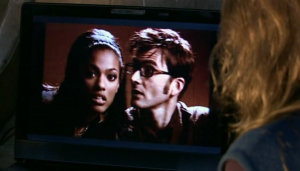 DAVID:
DAVID:
Although they are very different in other ways this reminded me of another “Doctor-lite” episode, “Love and Monsters”. While the Doctor doesn’t have much screen time in either, his presence hovers over everything that happens, casting a shadow over the entire story. While it may be that the rarity of these episodes, I would love to see more of them because they bring into focus the way the Doctor changes the lives of everyone he touches, even when it is only a brief encounter, and sometimes he really does seem a bit cavalier about it.
TEHANI:
That’s a good point – to me, the Doctor is (almost always) like a puppet master. There’s a sense that he (almost) always has control of the situation, even when he doesn’t appear to. But in the Doctor-lite episodes, you can SEE this. It’s a tangible thing, because otherwise the episode wouldn’t work!
JO:
I love the Doctor as an easter egg in this episode, the way he “Shows up where he’s not supposed to be.” I think it’s a great way to sum him up!
TANSY:
I agree – and it’s a sign of how iconic David Tennant as the Doctor has become that those few glimpses of him are so surreal and exciting.
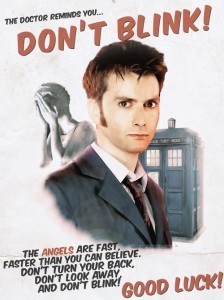 JO:
JO:
Even for me, who has never watched any Dr Who until now (yeah yeah, don’t all fall out of your chairs at once) and was very taken with Christopher Eccleston. So much so that I was even a bit skeptical of David Tennant at first. At first…
TEHANI:
I was determined NOT to like Tennant, Jo, but ended up loving him just like everyone else  Although having said that, second time around it is interesting to watch for the arrogance he plays in the Doctor, which makes him somewhat less likeable!
Although having said that, second time around it is interesting to watch for the arrogance he plays in the Doctor, which makes him somewhat less likeable!
DAVID:
As an episode this is another triumph for Moffat, it’s wonderfully tight and self contained and like “The Girl in the Fireplace”, you could imaginative showing it to someone with no idea of what Doctor Who is all about. I still think “Human Nature/The Family of Blood” deserved the Hugo more, but I am considerably less outraged! Not only is it a bit of mystery story where we slowly unravel what is happening with clue after clue coming together, but it is also a mighty fine example of the sort of horror I hate (and when I say hate I mean I enjoy but get the creeped the Hell out by). There is no blood or gore, just a deeply creepy atmosphere and that sense if you close your eyes something terrible might happen. Oh and the shock of something all of a sudden being that close to you! *shudders*
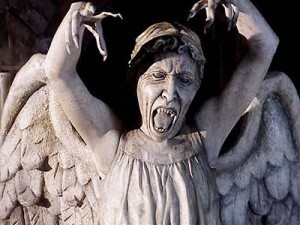 TEHANI:
TEHANI:
I have to say that the Weeping Angels are probably the creepiest of the New Who monsters for me. I find them genuinely scary, even though really, what they do is not as horrible as some – just relocate you to another time. No pain, no carnage, just the opportunity to live out your life somewhen else. Sure, you have to leave all your friends and family behind, but still… And yet they are sincerely terrifying!
JO:
This episode is such a horror movie. The Angels are seriously creepy (there’s a cemetery on my drive to work and thanks to Blink I cannot help but glance at the angel on my way past…). The old house has a haunted quality to it — statues that move, noises from upstairs, shadowy basement and unexplained writing on the wall. The musical score and direction only emphasise it.
I only really noticed how tight the writing and the imagery were on my second viewing. The first time round I was just creeped out and seriously wondering what was going to happen next. Second time around the prevalence of watching / viewing imagery really struck me. From movies going on in the background, the importance of the DVDs, to Sally repeating “Don’t look at me!” to Billy Shipton when she embarrasses herself in front of him. That scene seriously sent a tingle up my spine, because I knew what was about to happen next…
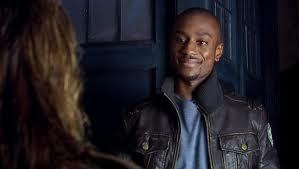 TANSY:
TANSY:
Billy is an amazing character – and he comes across in just three scenes. Sally’s friend Kathy is much the same – there’s a whole world in each of their performances, and we only get fragments of greater lives that are hinted at. The idea of a monster that kills you using your natural lifespan against you is brilliant and awful.
TEHANI:
I agree about Billy – another great actor for the episode. They were all pretty good weren’t they! But the scene with Billy and Sally flirting was just delightful. Then so sad 
DAVID:
Both stories of displacement were wonderfully told, I thought. Whether it was the letter from Kathy, or Billy’s death bed scene, there was a real emotional resonance. And the interesting thing is that both of them still managed to find a great deal of happiness in their altered lives, so on first examination you might almost think that what the Angels did to them wasn’t actually that bad. But, the terrible thing is that the Angels didn’t give them any choice in the matter, they simply took their future away without care for the consequences. Their victims’ lives could have just as easily ended in desperate loneliness as happiness, and whatever good came from it is due to the character of Kathy and Billy, not anything the Angels did.
JO:
Oh I like that, hadn’t thought of it that way before. In a way it makes their fates even more tragic. Both Billy and Kathy were strong enough to adapt, and find happiness. Makes them less like victims, somehow, and altogether just … sad. But sad is happy for deep people, right? :p
TANSY:
The key thing of course is that the Weeping Angels are no real threat to the Doctor – he could just hang around and wait. But that isn’t how he works and more importantly, having Martha with him ups the stakes because if she loses 40 years of her life, that’s a big deal.
Poor old Billy, though.
DAVID:
I thought the only real weak spot in this episode was the ending. It could have quite easily finished with them walking back into the shop, with Sally finally able to let go and move on with her life (something people who encounter the Doctor can’t always do!), the statue montage seemed a bit gimmicky and cheap compared to the rest of the episode. It’s a small quibble though, I can see why this episode inspired t-shirts (hmmm, there’s an idea…), it is exceptional. I’m willing to put up with the occasional Slitheen if it’s the price we pay for the other end of the scale.
TEHANI:
I don’t know, I kind of liked it – a nice creepy touch to finish it off!
TANSY:
I always forget that part, and laughed when I saw it – it is a touch that probably wasn’t necessary, over egging the pudding somewhat, but they weren’t to know how successful the episode would be in freaking people the hell out about statues out of the corner of their eyes…
JO:
I could have done without the statue montage. Sally doing what humans do, and getting on with her life would have been a stronger place to end it.
DAVID:
There were echoes of the Seventh Doctor in Ten here, as well, and I am thinking especially of Curse of Fenric and the idea of the Doctor as a bit of a manipulator of people and events. He really does set up the Angels as if it were a game of chess, moving all his pieces into position perfectly. Of course, the pieces are people. It also helps having Sally’s package of info, nothing like being a few moves ahead the whole time!
JO:
It’s cool that ultimately, Sally saves the day! The doctor relied on her and her package of info to know how to move all his pieces. I shall take this opportunity to add to the chorus of Sally-love!
TANSY:
Really the Doctor isn’t actually manipulating anything – it looks like he is throughout, and it plays on our acceptance that he does that sort of thing, but really it’s Sally that instigates the matter and he is just doing what he’s told. Which is quite a clever twist.
I think the history of the Doctor as the great manipulator helps with the fake out, though!
TEHANI:
I thought the device of the DVD easter egg was really cool! And cleverly done too – I mean, we know the Doctor can jump about and find out what went on as he pleases, but to have it be Sally who provides him with the information – nice touch!
What about the best friend? Narrative device or essential part of the story, do you think?
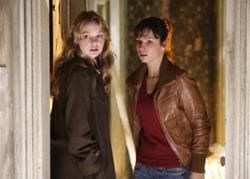 TANSY: Essential! Kathy is the reason that Sally is so determined to get to the heart of the matter – otherwise she’s just a bored girl playing at being a sleuth. Also that moment where the letter arrives and Kathy hasn’t actually LEFT YET – chilling!
TANSY: Essential! Kathy is the reason that Sally is so determined to get to the heart of the matter – otherwise she’s just a bored girl playing at being a sleuth. Also that moment where the letter arrives and Kathy hasn’t actually LEFT YET – chilling!
JO: Oh absolutely — so chilling. And sad. This initial friendship between Sally and Kathy is vital to the episode. As mentioned, it gives Sally a reason to keep searching for the truth, and really hits home for the viewer just how disturbing the Angels are. Sally has to go on without her. And she can’t even say goodbye.
DAVID:
Essential, definitely. Her fate gives us an idea of the stakes, it gives Sally a real reason to pursue her investigation no matter what obstacles get in her way, and it sets up one of my favourite scenes of the episode with the delivery of the letter. And, the moment Kathy realises where – and when – she has ended up is is wonderfully written. If it had been a stranger, or peripheral character, it wouldn’t have packed such an emotional punch.
JO:
I would like to say a quick thank you to you guys for including me in this, and for giving me such an awesome episode to work with! I’ve been really enjoying my Dr Who education so far, this is like an added bonus … or … an easter egg… 
TEHANI:
Thanks for joining us, it’s been fun!
=======
Watching New Who – in conversation with David McDonald, Tansy Rayner Roberts and Tehani Wessely
David is coming to New Who for the first time, having loved Classic Who as a kid. Tehani is a recent convert, and ploughed through Seasons 1 to 6 (so far) in just a few weeks after becoming addicted thanks to Matt Smith – she’s rewatching to keep up with David! Tansy is the expert in the team, with a history in Doctor Who fandom that goes WAY back, and a passion for Doctor Who that inspires us all (plus a seven-year-old daughter who is finding her own Doctors for the first time). We’re going to work our way through New Who, using season openers and closers, and Hugo shortlisted episodes, as our blogging points. Just for fun! We have already talked about:
“Rose”, S01E01
“Dalek”, S01E06
“Father’s Day, S01E08
“The Empty Child/The Doctor Dances”, S01E09/10
“Bad Wolf/The Parting of the Ways”, S01E12/13
Season One Report Card – David, Tansy, Tehani
“The Christmas Invasion,” 2005 Christmas special
“New Earth”, S02E01
“School Reunion,” S02E03
“The Girl in the Fireplace”, S02E04
“Rise of the Cybermen/Age of Steel”, S02E05/06
Army of Ghosts/Doomsday, S02E12/13
Season Two Report Cards: David, Tehani, Tansy
“The Runaway Bride”, 2006 Christmas Special
“Smith and Jones”, S03E01
The Shakespeare Code & Gridlock, S0302-03
Human Nature/The Family of Blood S0308-09

